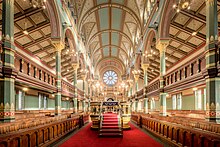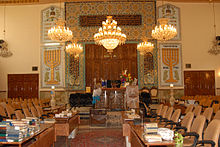
Back Sinagoge Afrikaans Synagoge ALS Sinoga AN यहूदी मंदिर ANP كنيس Arabic كنيس ARZ Sinagoga AST Sinaqoq Azerbaijani Синагога Bashkir Synagogn BAR

| Part of a series on |
| Judaism |
|---|
   |



A synagogue,[a] also called a shul[b] or a temple,[c] is a place of worship for Jews and Samaritans. It has a place for prayer (the main sanctuary and sometimes smaller chapels) where Jews attend religious services or special ceremonies such as weddings, bar and bat mitzvahs, choir performances, and children's plays. They also have rooms for study, social halls, administrative and charitable offices, classrooms for religious and Hebrew studies, and many places to sit and congregate. They often display commemorative, historic, or modern artwork alongside items of Jewish historical significance or history about the synagogue itself.
Synagogues are consecrated spaces used for Jewish prayer, study, assembly, and reading of the Torah (read in its entirety once a year, or in some synagogues on a triennial cycle, in weekly Torah portions during religious services). However, a synagogue is not always necessary for Jewish worship, due to adaptations during times of Jewish persecution in countries and regions that banned Judaism, frequently destroying and/or reappropriating synagogues into churches or even government buildings. Halakha (Jewish law from the Mishnah – the "Oral Torah") states that communal Jewish worship can be carried out wherever a minyan, a group of at least 10 Jewish adults, is assembled, often (but not necessarily) led by a rabbi. Worship can also happen alone or with fewer than ten people, but certain prayers are considered by halakha as solely communal; these can be recited only by a minyan. In terms of its specific ritual and liturgical functions, the synagogue does not replace the symbol of the long-destroyed Temple in Jerusalem.
Any Jew or group of Jews can build a synagogue. Synagogues have been constructed by ancient Jewish leaders, by wealthy patrons, as part of a wide range of human institutions including secular educational institutions, governments, and hotels, by the entire Jewish community of living in a particular village or region, or by sub-groups of Jewish people arrayed according to occupation, ethnicity (e.g., the Sephardic, Yemenite, Romaniote or Persian Jews of a town), style of religious observance (e.g., Reform or Orthodox synagogue), or by the followers of a particular rabbi, such as the shtiebelekh (Yiddish: שטיבעלעך, romanized: shtibelekh, singular שטיבל shtibl) of Hasidic Judaism.
Cite error: There are <ref group=lower-alpha> tags or {{efn}} templates on this page, but the references will not show without a {{reflist|group=lower-alpha}} template or {{notelist}} template (see the help page).
© MMXXIII Rich X Search. We shall prevail. All rights reserved. Rich X Search